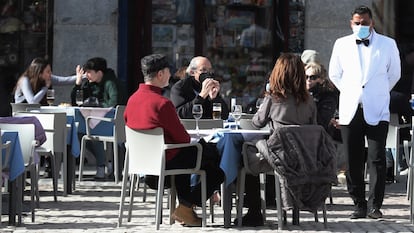Madrid tracking spread of new coronavirus strains first found in UK, Brazil
Several Spanish regions announce restrictions for the coming days despite a slight drop in the national incidence rate

The coronavirus variant first detected in Britain is extending through the Madrid region, officials said on Friday. In some areas, it already represents 50% of all detected cases.
“In some hospitals such as Gregorio Marañón, the positivity rate [of this strain] is 20%,” said Antonio Zapatero, the deputy chief of the regional health department. In the towns of Collado Villalba and Moralzarzal, northwest of the capital, it is 57% and 50%.
As for the strain first detected in Brazil, one out of five cases under investigation has turned out positive. It involves a 44-year-old man who arrived at Adolfo Suárez-Madrid Barajas airport on January 29. Although the passenger produced a negative PCR test result, he was given an antigen test on arrival and the result was positive. The man was taken to Gregorio Marañón hospital, where a new PCR was performed that confirmed the first case of the new strain in Spain.
Spain recently restricted flights from Brazil and South Africa in a bid to stop the spread of new strains of the coronavirus.
While the 14-day incidence rate has begun to slowly decline at the national level, it remains far above the threshold considered an extreme risk scenario by the government. On Friday, several regional governments (which are in charge of determining and implementing their own coronavirus measures) announced new restrictions for the coming days.
Madrid
On Friday, Madrid officials also announced that the limit on customers in outdoor seating areas is being raised from four to six per table. Indoors, only four people per table will be allowed, and establishments must still close at 9pm. Additionally, face masks are now mandatory in bars and restaurants instead of simply recommended, and venues must have adequate ventilation.
The change was first announced on Twitter by Madrid regional premier Isabel Díaz Ayuso, of the conservative Popular Party (PP), and published in the official gazette (BOCM) on Friday.
Deputy regional premier Ignacio Aguado, of Ciudadanos (Citizens), defended the looser restrictions on the food and drink sector. “The key to this third wave is to perform mass screenings and ensure that the government of Spain obtains more vaccines. Vaccination is synonymous with health and economic recovery,” he said.
Authorities have also reviewed the basic healthcare zones – areas that cut across neighborhoods and districts and may contain one or more primary healthcare centers – that will be under mobility restrictions from next Monday (see the full list here). The overnight curfew is still 10pm to 6am, and members of different households may not meet at each other’s homes, with exceptions made for people living alone who may receive visits under certain conditions.
Meanwhile, the number of students in confinement due to testing positive or being in close contact with a positive case has more than doubled in a week, going from 12,051 on January 27 to 25,540 on February 2, according to figures released on Thursday by the Madrid department of education. At the national level, 1.57% of Spain’s 65,000 classrooms have been closed due to the coronavirus.
Other regions
In Castilla-La Mancha, a region that includes the city of Toledo, health authorities confirmed that restrictions will remain in place for 10 more days due to the epidemiological situation. The regional health chief, Jesús Fernández Sanz, said that the figures are improving “very slowly.” All municipalities will remain sealed, with only essential travel allowed. Bars, restaurants, sports facilities and large retail stores are closed, cultural activities are cancelled, and there is a 10pm-to-7am curfew in place.
In the northern region of Asturias, authorities warned that the month of February could be “dramatic.” Regional premier Adrián Barbón, of the Socialist Party (PSOE), also warned that it will be necessary “to sacrifice Easter.”
“Easter in Asturias is not going to be like Christmas; let’s pop that balloon once and for all,” he said. “If we don’t want a fourth wave and would like to reach the end of the state of alarm [in May] in a good situation, there is no choice but to sacrifice Easter.”
In Andalusia, the government will wait until next week to decide whether to adopt different measures “if the drop in the incidence rate is definitive.” The region came close to its record high for single-day Covid-19 fatalities after registering 105 deaths, just under Tuesday’s high of 106.
With reporting by Isabel Valdés and Victoria Torres-Benayas.
English version by Susana Urra.
Tu suscripción se está usando en otro dispositivo
¿Quieres añadir otro usuario a tu suscripción?
Si continúas leyendo en este dispositivo, no se podrá leer en el otro.
FlechaTu suscripción se está usando en otro dispositivo y solo puedes acceder a EL PAÍS desde un dispositivo a la vez.
Si quieres compartir tu cuenta, cambia tu suscripción a la modalidad Premium, así podrás añadir otro usuario. Cada uno accederá con su propia cuenta de email, lo que os permitirá personalizar vuestra experiencia en EL PAÍS.
¿Tienes una suscripción de empresa? Accede aquí para contratar más cuentas.
En el caso de no saber quién está usando tu cuenta, te recomendamos cambiar tu contraseña aquí.
Si decides continuar compartiendo tu cuenta, este mensaje se mostrará en tu dispositivo y en el de la otra persona que está usando tu cuenta de forma indefinida, afectando a tu experiencia de lectura. Puedes consultar aquí los términos y condiciones de la suscripción digital.









































